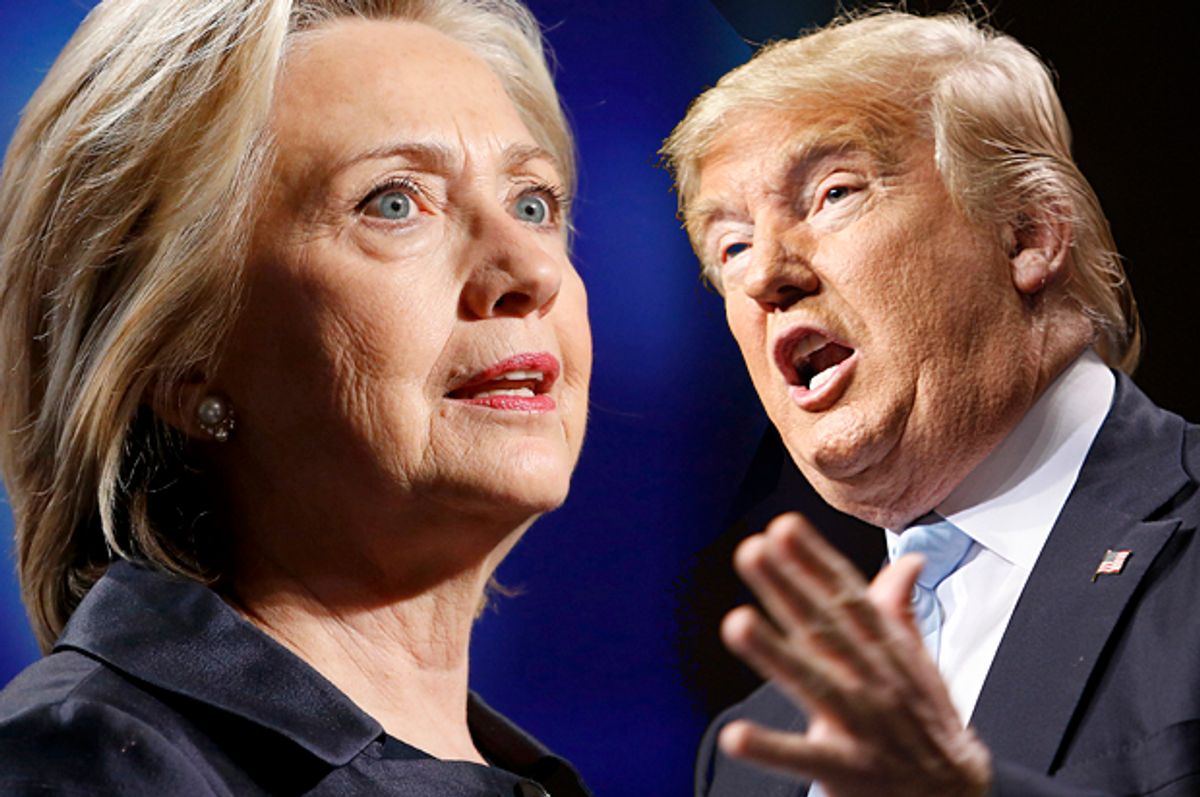Five states held their primary elections yesterday: Connecticut, Delaware, Maryland, Pennsylvania and Rhode Island. On the Republican side, the elections were a formality: Donald Trump was expected to cruise to victory in all five states, and that's exactly what happened.
Almost immediately after the polls were closed, Trump was declared the runaway winner in Pennsylvania, Maryland and Connecticut. And within an hour of the polls closing he had completed the sweep. The pre-election polls in every state had Trump leading by more than 20 points. In the two most delegate-rich states, Pennsylvania (71) and Maryland (38), Trump was ahead by 21 points. And the results were consistent with the polls: It was an utter blowout. The tallies hadn't been finalized as of this writing, but Trump looks to have won by massive margins in all five states.
Although Trump won at the voting booth, the delegate picture remains murky at best. Trump had 847 committed delegates before Tuesday's primaries (390 less than what he needs to secure the nomination), but it's not yet clear how many delegates his electoral victories will yield.
In Pennsylvania, for example, delegates are handed out in two chunks. By winning the state Trump automatically gets 17 of the 71 delegates. But the other 54 remain unpledged, meaning they're not obligated to back Trump at the convention even though he won their state by a considerable margin. Trump will net another 14 statewide delegates in Maryland and a few more in Connecticut, but beyond that it's wide open, and it's impossible to predict what the unbound delegates will do.
There are similar complications in other states as well. As a result, Tuesday doesn't tell us as much as it should about the Republican race. We knew already that Trump was the overwhelming choice of the voters. What we don't yet know is how much Republican elites are going to respect that at the convention, when it really matters.
Earlier this week, it was reported that Ted Cruz and John Kasich were uniting to prevent Trump from clinching the nomination. Predictably, their alliance imploded before the first vote was cast this week, and after Tuesday night they might want to reconsider.
Kasich was mathematically eliminated from a first ballot victory long ago. Cruz entered the night with 559 delegates. When the final delegate count from Tuesday is in, he'll very likely be eliminated too. Cruz is pouring a lot of resources into Indiana, hoping to stunt Trump's momentum. If the numbers from tonight hold up, however, none of it will matter: This is Trump's race to lose now.
On the Democratic side, Tuesday was decidedly less interesting. Every discussion of the Democratic contest has to begin with the caveat that delegates are awarded proportionally. Depending on how you tally it up, Clinton had something like a 240 delegate lead over Sanders heading into Tuesday. There were 284 pledged delegates up for grabs in Pennsylvania and Maryland alone. On paper, then, Sanders could have bridged the gap with Clinton.
But he didn't and here's why.
The proportional system means Sanders would have to win over 85 percent of the vote in these states to sweep the delegates. As expected, that didn't happen, and it's not likely to happen in any of the remaining states. Whatever benefits there are to awarding delegates proportionally, it’s exceedingly difficult to win from behind in this system, especially this late in the process.
Clinton was leading Sanders in the pre-election polls by an average of 16 points in Pennsylvania and 24 points in Maryland. As of this writing, Clinton has been declared the winner in Pennsylvania, Maryland, and Delaware and was projected to win Connecticut. Sanders, meanwhile, only notched a victory in Rhode Island.
Bottom line: The Democratic race is no longer about the delegate count – that part is over. Clinton will be the nominee. There just isn’t a realistic path to the nomination for Sanders, and math will only get worse in the coming weeks.
The Sanders campaign, as I noted Monday, has already started looking beyond 2016. Sanders wants to put his stamp on the Democratic agenda. Finishing strong will give him more leverage to do so, and that's why his continued presence in these primary battles matters. He will – and should – put pressure on Clinton until the convention.
But the delegate tallies today and in future primaries, barring a miracle, won't alter the dynamics of the race. Clinton now sits on a comfortable lead, and her campaign is on cruise control at this point. Nothing that happened Tuesday changes that fact. After this latest run of primaries, Sanders will have to think seriously about how he wants to campaign moving forward. There's no reason for him to end his campaign anytime soon, but the tone he sets henceforth will matter a great deal.

Shares